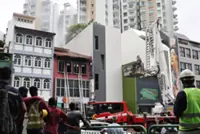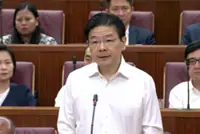
Philippine President Ferdinand Marcos Jr (sixth from right) with 11 out of the 12 senatorial candidates he is endorsing for the May 2025 midterm elections. - PHILIPPINE PRESIDENTIAL COMMUNICATIONS OFFICE
MANILA: Politics has always been a family affair in the Philippines. And the May 2025 midterms will be no different as election fever begins, with dynastic clans and celebrities poised to dominate the coming polls that are seen as a proxy war between President Ferdinand Marcos Jr and his erstwhile allies, the Dutertes.
The week-long candidacy filing period for 2025’s elections that culminated on Tuesday (Oct 8) saw a slew of familiar faces, among them figures from well-entrenched political dynasties and public personalities, many of whom are leading in the pre-election surveys.
A surprise candidacy filing on the final day was for doomsday pastor Apollo Quiboloy, who is facing child sexual abuse and human trafficking charges.
The controversial 74-year-old preacher, an ally and spiritual adviser of former president Rodrigo Duterte, was arrested in September after a long manhunt and is currently detained in Manila while awaiting trial. Quiboloy’s lawyer filed the candidacy papers for him.
The circumstances are not without precedent. In May 2022, Jose Estrada won a Senate seat while on trial for corruption. He took up the post and was acquitted in January 2024.
Candidates are disqualified from standing in Senate elections only if they have exhausted all appeals after being convicted of offences involving “moral turpitude”, according to the election code, which does not list specific crimes.
Up for grabs are over 18,000 seats nationwide in the midterm polls held every three years, where Filipinos vote for 12 out of 24 Senate seats, over 300 congressmen and thousands of local officials in every province, city and town.
The 2025 midterms will not only serve as a referendum on Marcos, but will also be a litmus test of the political influence of Vice-President Sara Duterte, daughter of Rodrigo Duterte, whose family is now at odds with the President.
What was once a vaunted alliance between the Philippines’ two most powerful political clans has turned sour only two years into Marcos’ six-year presidency due to irreconcilable political differences.
The Marcos-Duterte feud is playing out visibly in the Senate race, with political heavyweights allied with either camp forming the so-called winners’ circle or “Magic 12”.
“I can’t remember the last time that a Godzilla versus King Kong kind of battle was this pronounced in an election,” veteran Filipino campaign strategist Alan German told The Straits Times.
“Man, message, machinery and money – those are the components of an election. There will be a movement of machinery and money unlike we’ve seen before.”
Marcos has already endorsed a 12-person senatorial slate filled with veterans who have dominated elections in the past. Eight of them are either incumbent senators seeking re-election or veteran politicians seeking a return to the Senate.
They include the likes of boxing legend Manny Pacquiao and former senator Panfilo Lacson. Both men ran for president in 2022 but lost. Lacson’s running mate then, comedian-actor Vicente Sotto III, who previously served as Senate president, also aims to make a comeback.
Also in the Marcos camp is long-time senator Pia Cayetano, an advocate for empowering women through fitness and sports, who is seeking re-election for a fourth term. Her brother, a former House speaker, is currently a senator as well.
Then there is the family of tycoon Manny Villar, the richest person in the Philippines, who once served as Senate president. His wife Cynthia Villar, who is concluding two terms as senator, is running for the Las Pinas seat in the House of Representatives – hoping to essentially swop places with her daughter Camille, which is not an unusual practice in the Philippines. Her son, Mark, is an incumbent senator and served as Rodrigo Duterte’s public works secretary before resigning.
Marcos initially included his sister, incumbent senator Imee Marcos, in his slate. But she later withdrew from that slate, saying she would campaign independently. She is an ally of Sara Duterte and has criticised some of her brother’s policies in the past.
Though the Dutertes have yet to formally endorse their own slate, seven senatorial bets have openly pledged their allegiance to the still-powerful clan.
Among them are incumbent senators Bong Go, Rodrigo’s former presidential assistant, and Ronald dela Rosa, who implemented Rodrigo’s bloody drug war as his former police chief.
It remains to be seen, however, if Vice-President Duterte will be joining the candidates on the campaign trail.
Sara Duterte had resigned from her posts as education minister and vice-chair of an anti-insurgency task force in June, signalling the growing public rift between the Duterte and Marcos families.
Meanwhile, her father, who had a good chance of winning in the Senate according to the surveys, has decided to run for mayor of Davao City instead. Rodrigo was mayor there for 22 years before he became president from 2016 to 2022.
Midterm elections in the Philippines are usually dominated by dynasties and other career politicians because they have deep pockets and are usually popular with the people in their bases, said political analyst Cleve Arguelles of De La Salle University in Manila.
He said incumbent politicians running under Marcos’ slate also gain an advantage, as they tend to be “favoured” by the administration in terms of budget allocation and the delivery of government programmes associated with their respective offices.
“The administration-backed candidates have an advantage because Marcos’ endorsement is an extension of the popularity of the President,” Arguelles said.
He said some celebrities and social media influencers vying for local posts could likely win in 2025 too, as the public already knows who they are.
“Half the battle is already won. You just have to convince them to vote for you,” Arguelles said.
The official campaign period will kick off only in February 2025, but candidates are expected to begin going around the country in the coming weeks.
While a new election season has returned to the Philippines, it is very likely that the same old faces will take the plum posts come election day on May 12.
German attributed this to many voters’ perennial lack of understanding of what specific elective posts entail, saying: “The root cause of that is Filipinos don’t know the roles of the branches of government. They don’t know who the right person for the right job is.” - The Straits Times/ANN








































